Die
Haut
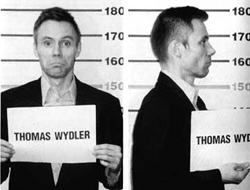 This
whole time that I was doing The
Gun Club and the Bad
Seeds in Berlin there were also lots of other things
going on. Like I said, Hansa Studios was a hotbed of activity
in West Berlin at the time. And one of the things that came about
was the Die
Haut records. Die Haut were a band that had Thomas
Wydler, who was the drummer in the Bad Seeds, and Rainer Lingk
and Christoph Dreher and Jochen Arbeit. And they were known as
an instrumental band with guest vocalists. Nick Cave had done
an album with them, Burning the Ice, and Lydia
Lunch. So they were planning a new recording at Hansa
studio and they were going to do this album A
Headless Body in a Topless Bar and, in the tradition
of Die Haut, what they did is make instrumental tracks and then
they got guest singers to do things on it.
This
whole time that I was doing The
Gun Club and the Bad
Seeds in Berlin there were also lots of other things
going on. Like I said, Hansa Studios was a hotbed of activity
in West Berlin at the time. And one of the things that came about
was the Die
Haut records. Die Haut were a band that had Thomas
Wydler, who was the drummer in the Bad Seeds, and Rainer Lingk
and Christoph Dreher and Jochen Arbeit. And they were known as
an instrumental band with guest vocalists. Nick Cave had done
an album with them, Burning the Ice, and Lydia
Lunch. So they were planning a new recording at Hansa
studio and they were going to do this album A
Headless Body in a Topless Bar and, in the tradition
of Die Haut, what they did is make instrumental tracks and then
they got guest singers to do things on it. 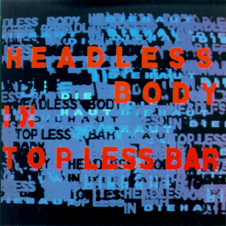 And
so they were, because of Thomas, and because Christoph was involved
in making a lot of videos with Nick, they were in our family of
people. And they asked me to do a track or two on their record.
I think I might even have suggested it to them that i do a track
- because what I saw a lot of was that they were getting singers
to be on their record and I thought that I would be a really good
vocalist because of my kind of talking kind of style. And I thought
what they needed was someone to go through the music rather than
over the music. So I think they bought that bunch of baloney and
let me do a track or two. That was good. That was another step
in the direction of my singing. It was actually a thing that I
saw that I could actually fit in. And they got very excited with
what I did with things - which was actually an understated thing
rather than singing.
And
so they were, because of Thomas, and because Christoph was involved
in making a lot of videos with Nick, they were in our family of
people. And they asked me to do a track or two on their record.
I think I might even have suggested it to them that i do a track
- because what I saw a lot of was that they were getting singers
to be on their record and I thought that I would be a really good
vocalist because of my kind of talking kind of style. And I thought
what they needed was someone to go through the music rather than
over the music. So I think they bought that bunch of baloney and
let me do a track or two. That was good. That was another step
in the direction of my singing. It was actually a thing that I
saw that I could actually fit in. And they got very excited with
what I did with things - which was actually an understated thing
rather than singing.
And
then I did some live shows with them too. And that was really
good because it was really fun to go onstage without a guitar
and go on for four minutes and do a song and leave.
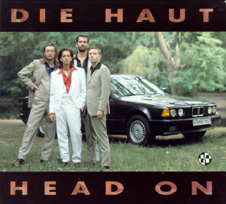 And
then they did another album a year or two later which was celebrating
their – I can’t remember it was - either their ten
or twenty year anniversary. And for this record they got out the
big guns. They already had Nick Cave and me or Mick – they
already had their friends on it. But then they decided, for the
Head On
album, to get Alan
Vega and Debbie
Harry and Jeffrey
Lee Pierce to do numbers on it. And that turned out
really fun. I ended up doing a duet with Lydia Lunch – which
was fun to reconnect with her and finally do a project some years
later.
And
then they did another album a year or two later which was celebrating
their – I can’t remember it was - either their ten
or twenty year anniversary. And for this record they got out the
big guns. They already had Nick Cave and me or Mick – they
already had their friends on it. But then they decided, for the
Head On
album, to get Alan
Vega and Debbie
Harry and Jeffrey
Lee Pierce to do numbers on it. And that turned out
really fun. I ended up doing a duet with Lydia Lunch – which
was fun to reconnect with her and finally do a project some years
later.
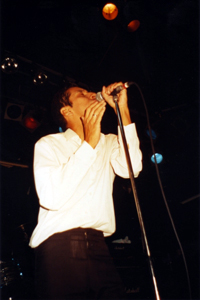
The thing that was fun about that was that they put a tour together.
Not a long one – but a short one. And it was a crazy debauched
circus of people. For the live tour it was me, Anita
Lane, Lydia Lunch, Blixa
Bargeld, Nick Cave, and Jeffrey Lee Pierce and Alex
Hacke. They were very smart and advertised it as
their big ten-year anniversary. And we did some crazy shows and
really had fun. We had a tour bus and jumped in, had crazy disco
parties on the freeway, danced in the isles, and went onstage.
And that was a fun experience.
I
had written my own lyrics for all of those songs. It was good
because I was actually doing a lot of writing again. The community
of people I was with were really good, literary smart people.
We always traded books and there was lots of reading going on.
And we were very interested in our lyrical writing and prose and
things. That time was really influential and made me confident
as a writer of lyrics.
Kid
sings with Die Haut at the Hague in 1992.
Courtesy of
From the Archives.
In
the Heat of the Night
 So
because of the Die Haut experience I was more confident in singing.
This was post-Mother
Juno. And I was once again going to try to do
a solo record and I asked Robin
Guthrie again, who I’d met through Mother
Juno, and some friends of mine like Marcia
Schofield from The
Fall, and Barry
Adamson, and this guy who produced the record, Ray
Conroy, who was the manager of the band Colourbox
and that band M/A/R/R/S, who did that song “Pump
Up the Volume.” We had an idea that we were
going to mix rock and dance music together and my kind of guitar
playing – that was going to be the form for my solo record.
So we recorded that in London at September Sound, which was Robin’s
studio.
So
because of the Die Haut experience I was more confident in singing.
This was post-Mother
Juno. And I was once again going to try to do
a solo record and I asked Robin
Guthrie again, who I’d met through Mother
Juno, and some friends of mine like Marcia
Schofield from The
Fall, and Barry
Adamson, and this guy who produced the record, Ray
Conroy, who was the manager of the band Colourbox
and that band M/A/R/R/S, who did that song “Pump
Up the Volume.” We had an idea that we were
going to mix rock and dance music together and my kind of guitar
playing – that was going to be the form for my solo record.
So we recorded that in London at September Sound, which was Robin’s
studio.
And
that came out to great critical fanfare. But something crazy happened
with Rough Trade where the warehouse that was holding their stuff
weren’t getting paid. So, all of this press - and they made
a video – but the record didn’t come out until four
months after the press and everything because of the hold-up of
the records in the warehouse. So more indie-torture... And nothing
really came of that except for the recording. We never did a live
set for it or anything.
I
don’t know the reason why it was the last kind of solo thing.
I think it was because right after that I got involved with making
Congo
Norvell
- which actually became a project I got really into - and
we had a singer who could more than enough sing - Sally
Norvell is an incredible singer. I got so excited
about her singing that I really wanted to write songs that would
be good vehicles for her to sing. I thought that her voice could
be completely devastating if I wrote the right songs for her.
I wanted to really dedicate time to working with her. There was
such good chemistry that there was no reason to do anything else.
That was kind of the reason why I didn’t do any other solo
stuff.
Congo
Norvell
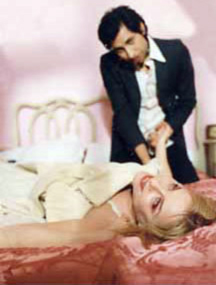 Congo
Norvell was a band I started after I moved back to Los Angeles
in probably 1989/90. We were introduced by a mutual friend who
told me about her and he had mentioned that she had been in a
Wim Wenders film as well (Sally Norvell played a nurse in Paris,
TX. Kid performed with Nick Cave and the Bad
Seeds in Wim
Wenders Wings
of Desire). And there was this really amazing
singer that he knew and she was really dying to do something but
didn’t really have quite a direction and she couldn’t
find the right people to collaborate with. She was actually in
the film business in Los Angeles and it didn’t give her
a lot of time to pursue her musical interests. What she was doing
was singing standards at a jazz club one night a week or one night
a month or something.
Congo
Norvell was a band I started after I moved back to Los Angeles
in probably 1989/90. We were introduced by a mutual friend who
told me about her and he had mentioned that she had been in a
Wim Wenders film as well (Sally Norvell played a nurse in Paris,
TX. Kid performed with Nick Cave and the Bad
Seeds in Wim
Wenders Wings
of Desire). And there was this really amazing
singer that he knew and she was really dying to do something but
didn’t really have quite a direction and she couldn’t
find the right people to collaborate with. She was actually in
the film business in Los Angeles and it didn’t give her
a lot of time to pursue her musical interests. What she was doing
was singing standards at a jazz club one night a week or one night
a month or something.
He
invited me to go with him to go see her and I was completely devastated
by this incredible voice she had. She had a really great voice,
a really great stage presence, and she really sang these standards
but somehow made them her own and made them really come to life.
And that wasn’t just singing standards – it was coming
from her. And so I was really really impressed and was like, “I
have to do something with her if she’s game.”
I
met her and we embarked on doing something. So the first thing
we did, because we didn’t have a band or any kind of thing,
was, we were talking about our friends and AIDS and the second
generation of people dying of AIDS who were our peers and our
friends. Because we knew a lot of artists, we knew a lot of people
who took drugs, a lot of sexually promiscuous people, a lot of
gay people, it was like everyone – it wasn’t like
one group of people. The first wave of our friends were gay men,
and it was getting closer to our age group. We were obviously
very distraught about this but very much wanted to make something
good come out of it. And we decided that we would write a song
or two that reflect the emotional part of it. Because of her being
a jazz-singer, it was kind of like, “Let’s focus on
making a torch song – addressing this being a little more,
‘how can you see some light’ kind of gospel. And we
wrote some songs like that song “Lullaby” on that
EP. I had this John
Lee Hooker bootleg where all he’s doing is
tapping on his guitar the whole time and he’s making it
ring. And so I was playing around with that. So we did a song
like that and it became our big hit. That was a big one in our
live show.
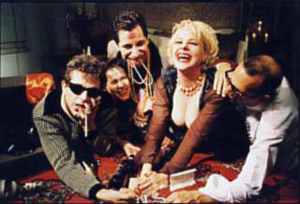 We
got some people to play with us. Jim Sclavunous played with us
for a while and we got some people together and actually made
a band. We started to play live shows – art events and AIDS
benefits and things like that. Kind of slowly it morphed into
a band and we started making songs and then we realized that we
wanted to continue and actually make a band out of all of this
and be serious about it. So we gathered our friends together –
Kristian
Hoffman (from The
Mumps) and this woman Mary Mullen and we started
to play live and started to get a following. Our (Lullabies)had
a little cult-y success and was well liked. Somehow we got lumped
into this trend of lounge that was emerging in the world –
especially in the Los Angeles world.
We
got some people to play with us. Jim Sclavunous played with us
for a while and we got some people together and actually made
a band. We started to play live shows – art events and AIDS
benefits and things like that. Kind of slowly it morphed into
a band and we started making songs and then we realized that we
wanted to continue and actually make a band out of all of this
and be serious about it. So we gathered our friends together –
Kristian
Hoffman (from The
Mumps) and this woman Mary Mullen and we started
to play live and started to get a following. Our (Lullabies)had
a little cult-y success and was well liked. Somehow we got lumped
into this trend of lounge that was emerging in the world –
especially in the Los Angeles world.
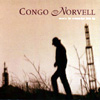 We
attracted the attention of people who put out records. We had
a record on this label Basura – who, funny enough, was distributed
by Priority Records, who were Ice
Cube and NWA’s
label. So it was a really funny thing that they wanted to start
an alternative label. So we put out one album, Music
to Remember Him By - that was the title of it.
And we did a lot of touring. They wanted us to do another record
and they wanted us to be on the biggy - Priority label.
We
attracted the attention of people who put out records. We had
a record on this label Basura – who, funny enough, was distributed
by Priority Records, who were Ice
Cube and NWA’s
label. So it was a really funny thing that they wanted to start
an alternative label. So we put out one album, Music
to Remember Him By - that was the title of it.
And we did a lot of touring. They wanted us to do another record
and they wanted us to be on the biggy - Priority label.
 So
we made another album (The
Dope, The Lies, The Vaseline) and that was really
well done. We put a lot of, lot of, lot of work into it. It came
out really great. It got to the point where they already had promos
mailed out, and it was starting to get reviewed and a tour booked.
And it was getting really rave reviews. We were really getting
noticed. It just seemed like, “Wow, something’s going
to really happen.” Because you can tell when something’s
going to happen by the pre-press. At the last second, Priority,
without word, just decided that they weren’t going to put
out their alternative records anymore. And so we were left kind
of high and dry. We were devastated. We begged them to let us
buy it from them. We did everything and they just wouldn’t
budge. Their lawyers were in lawyer-head. And it didn’t
matter what we said or however we pleaded to them on whatever
artistic level or whatever business level we tried, they decided
they were just going to sit on it. We were really upset and devastated
and mad and angry and ready to murder somebody. So we decided,
“Well they’re really not going to give it to us, and
it’s really fucked up and we are going to move to New York
because LA’s obviously not the place for us and this whole
game is really a stupid game and we don’t want to have a
part of it anymore. We’re worth much more than that. And
why don’t we go where someone might understand us and want
to do something?” So we packed up a Rider truck and we drove
across country to New York and moved here. That’s where
we are now and I’ve been here ever since.
So
we made another album (The
Dope, The Lies, The Vaseline) and that was really
well done. We put a lot of, lot of, lot of work into it. It came
out really great. It got to the point where they already had promos
mailed out, and it was starting to get reviewed and a tour booked.
And it was getting really rave reviews. We were really getting
noticed. It just seemed like, “Wow, something’s going
to really happen.” Because you can tell when something’s
going to happen by the pre-press. At the last second, Priority,
without word, just decided that they weren’t going to put
out their alternative records anymore. And so we were left kind
of high and dry. We were devastated. We begged them to let us
buy it from them. We did everything and they just wouldn’t
budge. Their lawyers were in lawyer-head. And it didn’t
matter what we said or however we pleaded to them on whatever
artistic level or whatever business level we tried, they decided
they were just going to sit on it. We were really upset and devastated
and mad and angry and ready to murder somebody. So we decided,
“Well they’re really not going to give it to us, and
it’s really fucked up and we are going to move to New York
because LA’s obviously not the place for us and this whole
game is really a stupid game and we don’t want to have a
part of it anymore. We’re worth much more than that. And
why don’t we go where someone might understand us and want
to do something?” So we packed up a Rider truck and we drove
across country to New York and moved here. That’s where
we are now and I’ve been here ever since.
So
that was a whole new thing for us. I felt really great moving
back to New York. I knew a lot of people. The music scene at the
time was really great. There was a real support between bands
and a real camaraderie and a kind of music scene going on that’s
very different than it is now. 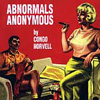 It
wasn’t just young new people – it was a lot of people
who had been around. It was very artistically-driven and very
very up-for-grabs. We got a record label right away and recorded
an album – that was Abnormals
Anonymous. And that had a big good success.
It
wasn’t just young new people – it was a lot of people
who had been around. It was very artistically-driven and very
very up-for-grabs. We got a record label right away and recorded
an album – that was Abnormals
Anonymous. And that had a big good success.
Somehow
we weren’t able to tour. And this had to do with some personal
restrictions. Sally had to work and Sally had a kid. She wasn’t
able to leave as easily as in the past. She had gone through a
divorce. She didn’t have a husband. She was a single mother.
So we only played locally some and east coast. And that kind of
led to some disillusionment and putting things on hold for a while.
And we just said, “Obviously we can’t do this right
now – physically do it. So let’s see what happens.”
We haven’t got back together just yet. But there’s
often talk about it. We’ve done many reunion shows and many
collaborations together. But we haven’t gone the whole hog.
And I think that’s because I went on to do other bands that
were kind of demanding.
Continue
to 11. "Guitar Man": Collaborations and Guest
Appearances
Kid
Congo Powers Pt 2 home page | Kid
Congo Powers Oral History table of contents
New York Night
Train home page | New
York Night Train table of contents
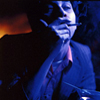
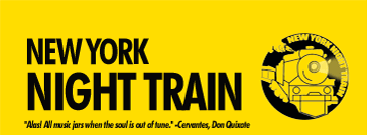
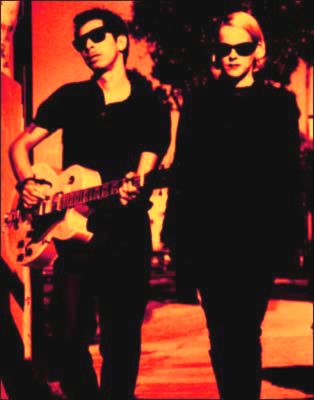
 This
whole time that I was doing
This
whole time that I was doing  And
so they were, because of Thomas, and because Christoph was involved
in making a lot of videos with Nick, they were in our family of
people. And they asked me to do a track or two on their record.
I think I might even have suggested it to them that i do a track
- because what I saw a lot of was that they were getting singers
to be on their record and I thought that I would be a really good
vocalist because of my kind of talking kind of style. And I thought
what they needed was someone to go through the music rather than
over the music. So I think they bought that bunch of baloney and
let me do a track or two. That was good. That was another step
in the direction of my singing. It was actually a thing that I
saw that I could actually fit in. And they got very excited with
what I did with things - which was actually an understated thing
rather than singing.
And
so they were, because of Thomas, and because Christoph was involved
in making a lot of videos with Nick, they were in our family of
people. And they asked me to do a track or two on their record.
I think I might even have suggested it to them that i do a track
- because what I saw a lot of was that they were getting singers
to be on their record and I thought that I would be a really good
vocalist because of my kind of talking kind of style. And I thought
what they needed was someone to go through the music rather than
over the music. So I think they bought that bunch of baloney and
let me do a track or two. That was good. That was another step
in the direction of my singing. It was actually a thing that I
saw that I could actually fit in. And they got very excited with
what I did with things - which was actually an understated thing
rather than singing. And
then they did another album a year or two later which was celebrating
their – I can’t remember it was - either their ten
or twenty year anniversary. And for this record they got out the
big guns. They already had Nick Cave and me or Mick – they
already had their friends on it. But then they decided, for the
And
then they did another album a year or two later which was celebrating
their – I can’t remember it was - either their ten
or twenty year anniversary. And for this record they got out the
big guns. They already had Nick Cave and me or Mick – they
already had their friends on it. But then they decided, for the

 So
because of the Die Haut experience I was more confident in singing.
This was post-
So
because of the Die Haut experience I was more confident in singing.
This was post- Congo
Norvell was a band I started after I moved back to Los Angeles
in probably 1989/90. We were introduced by a mutual friend who
told me about her and he had mentioned that she had been in a
Wim Wenders film as well (Sally Norvell played a nurse in
Congo
Norvell was a band I started after I moved back to Los Angeles
in probably 1989/90. We were introduced by a mutual friend who
told me about her and he had mentioned that she had been in a
Wim Wenders film as well (Sally Norvell played a nurse in  We
got some people to play with us. Jim Sclavunous played with us
for a while and we got some people together and actually made
a band. We started to play live shows – art events and AIDS
benefits and things like that. Kind of slowly it morphed into
a band and we started making songs and then we realized that we
wanted to continue and actually make a band out of all of this
and be serious about it. So we gathered our friends together –
We
got some people to play with us. Jim Sclavunous played with us
for a while and we got some people together and actually made
a band. We started to play live shows – art events and AIDS
benefits and things like that. Kind of slowly it morphed into
a band and we started making songs and then we realized that we
wanted to continue and actually make a band out of all of this
and be serious about it. So we gathered our friends together –
 We
attracted the attention of people who put out records. We had
a record on this label Basura – who, funny enough, was distributed
by Priority Records, who were
We
attracted the attention of people who put out records. We had
a record on this label Basura – who, funny enough, was distributed
by Priority Records, who were  So
we made another album (
So
we made another album ( It
wasn’t just young new people – it was a lot of people
who had been around. It was very artistically-driven and very
very up-for-grabs. We got a record label right away and recorded
an album – that was
It
wasn’t just young new people – it was a lot of people
who had been around. It was very artistically-driven and very
very up-for-grabs. We got a record label right away and recorded
an album – that was